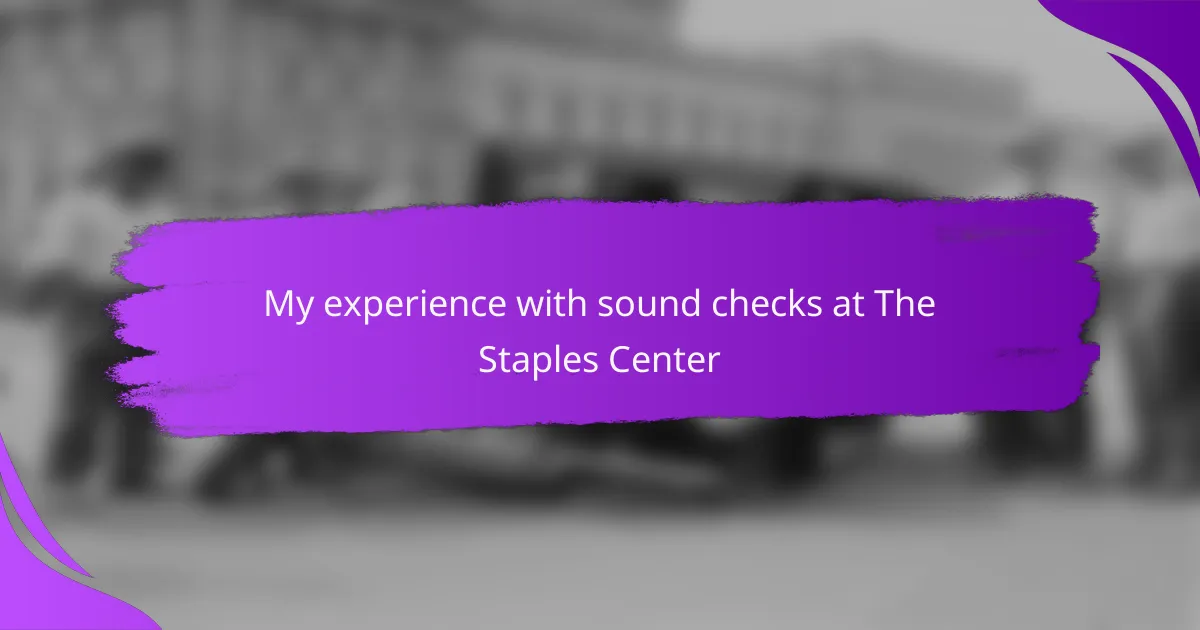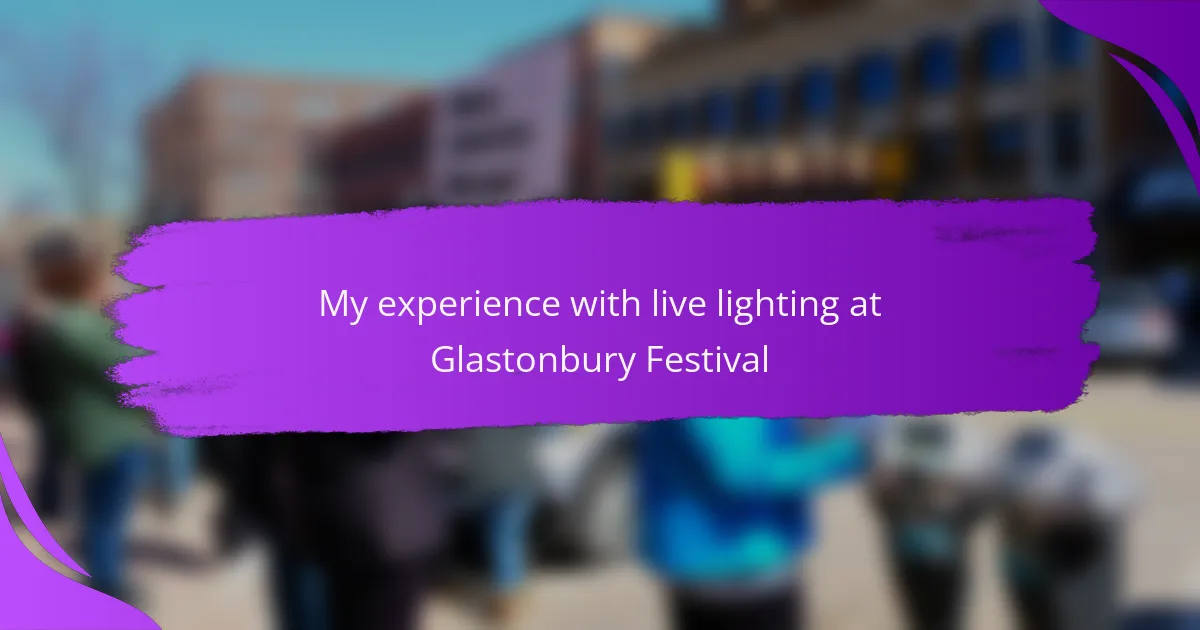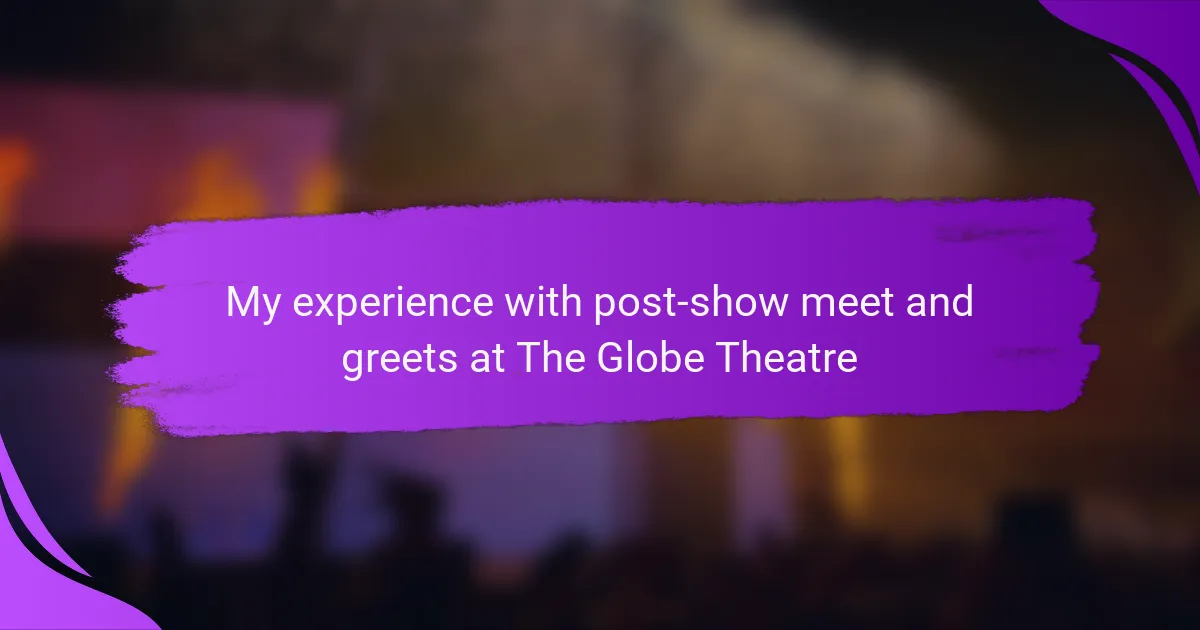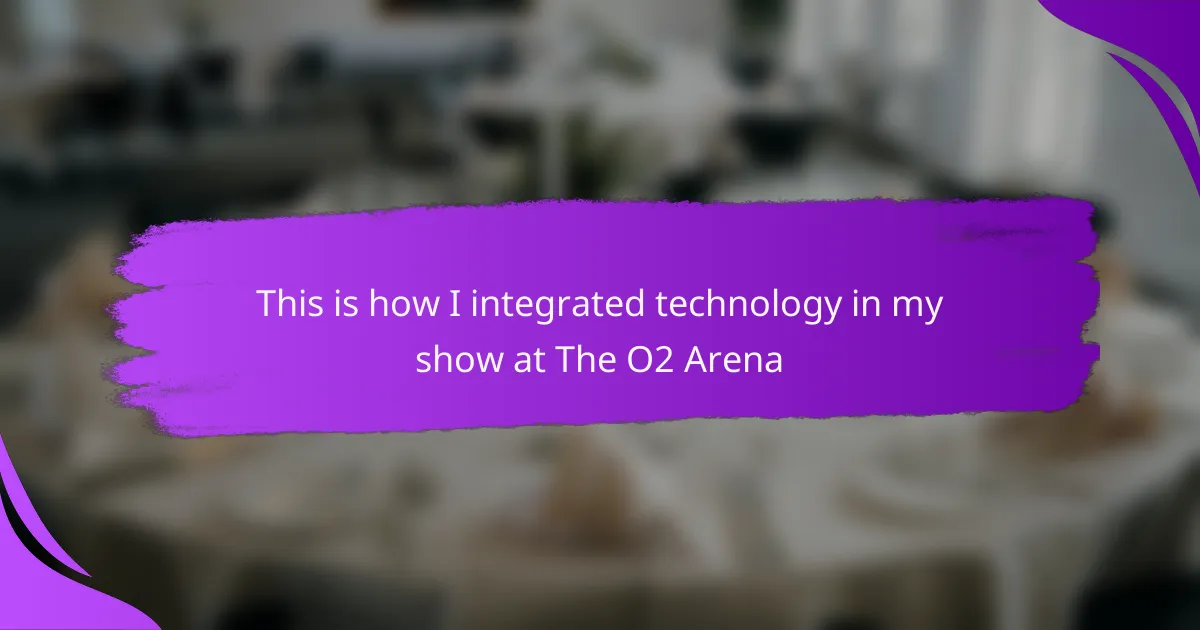Key takeaways
- Stage fright is a common challenge for performers, often caused by fear of judgment and anxiety, but it can be managed through effective strategies like deep breathing and visualization.
- Overcoming stage fright enhances performance quality, builds confidence, and fosters a stronger connection with the audience, transforming fear into excitement.
- Preparation, consistency in practice, and setting small goals can significantly reduce anxiety and improve overall performance experiences.
- Engaging in positive self-talk and redefining the audience as supporters helps to alleviate stress, allowing performers to thrive in live settings.
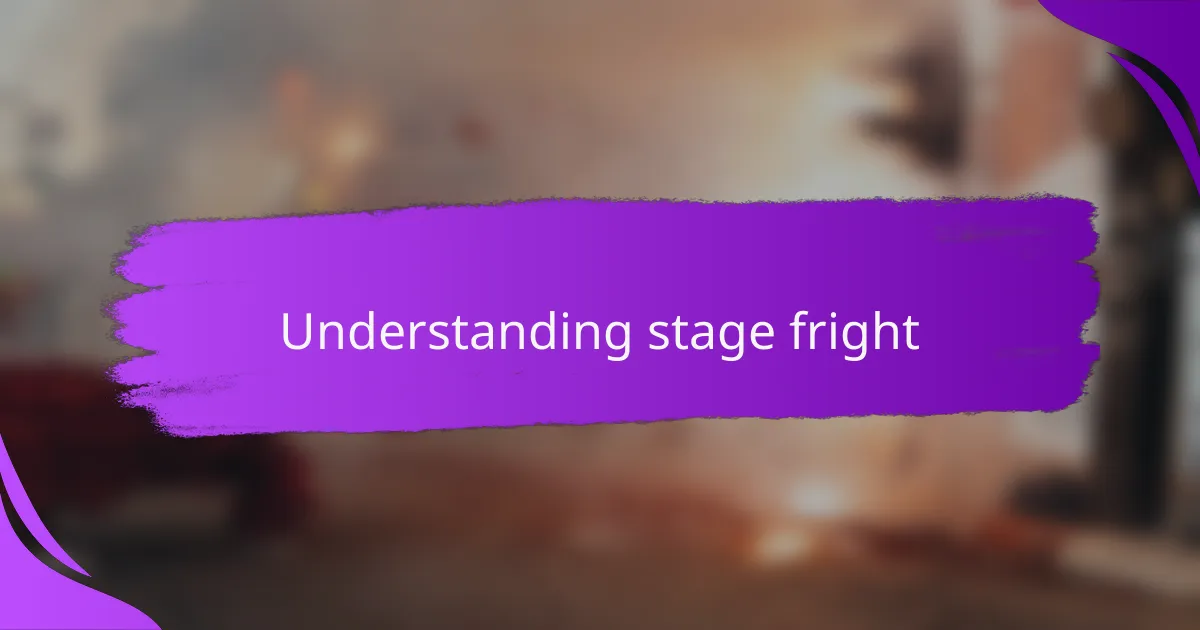
Understanding stage fright
Stage fright is a common experience for performers, including artists in nightclub settings like The Orpheum Theatre. When I found myself standing backstage, my heart raced, palms sweated, and I felt a lump in my throat. It’s fascinating how our minds can create such overwhelming pressure, even when we know our audience is there to enjoy the show.
The feeling can stem from various sources, such as fear of judgment or the pressure to succeed. Personally, I’ve struggled with self-doubt before taking the stage. It often felt like the spotlight amplified my insecurities, but over time, I learned to channel that energy into my performance rather than let it overwhelm me.
Here’s a comparison table that illustrates the differences between common emotions experienced during stage fright and strategies I’ve found effective in overcoming them:
| Emotions | Strategies |
|---|---|
| Nervousness | Deep breathing exercises |
| Fear of judgment | Positive self-talk |
| Insecurity | Preparation and rehearsal |
| Overwhelming pressure | Visualization techniques |
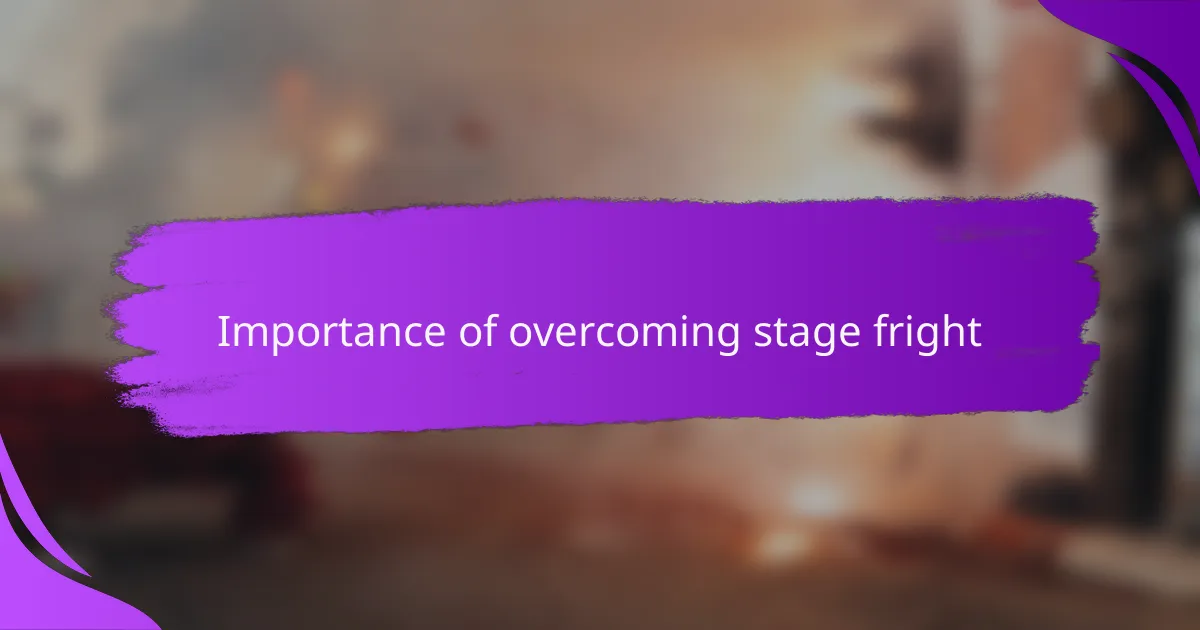
Importance of overcoming stage fright
Overcoming stage fright is crucial for anyone looking to thrive in the entertainment industry. In my experience, the excitement of performing can quickly turn into a wave of anxiety, threatening to overshadow the thrill of being on stage. Conquering this fear not only enhances performance quality but also builds confidence, allowing artists to connect more genuinely with their audience.
When I first stepped onto the stage at The Orpheum Theatre, my heart raced and my palms were sweaty. Yet, embracing that vulnerability transformed my performance into something magical. I learned that each time I faced my fears, I not only improved as an entertainer but also grew personally, uncovering resilience I didn’t know I possessed.
| Aspect | Impact of Overcoming Stage Fright |
|---|---|
| Performance Quality | Improved delivery and presence on stage |
| Confidence | Increased self-assurance in abilities |
| Audience Engagement | Stronger connection with the audience |
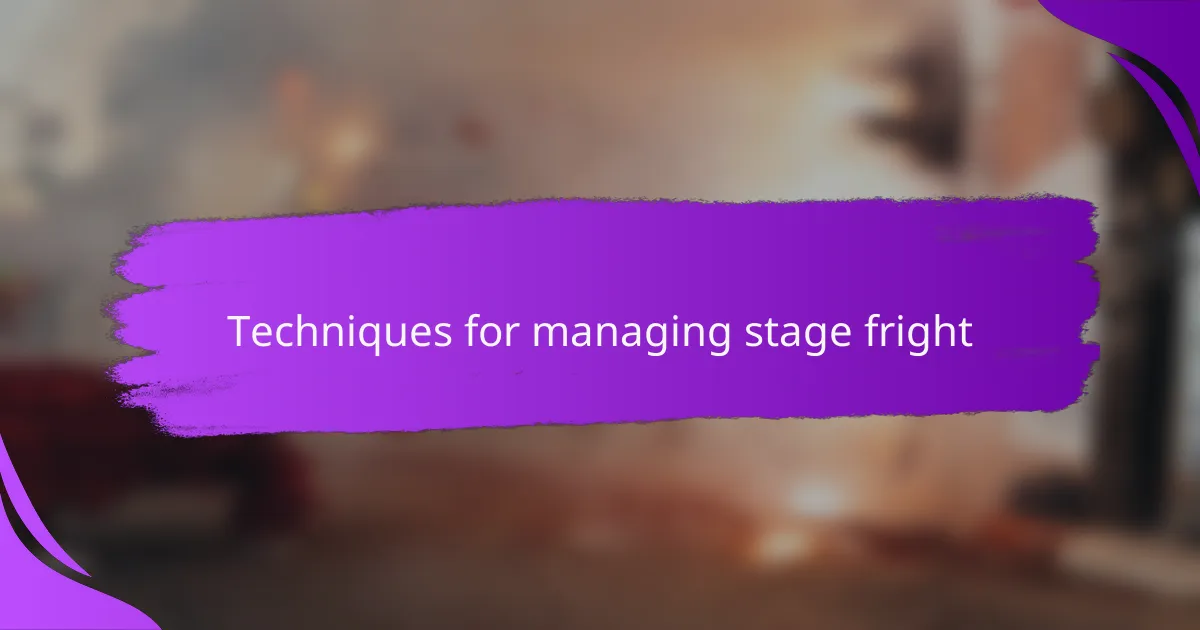
Techniques for managing stage fright
Focusing on your breath can be a real game-changer. I remember standing backstage, feeling the adrenaline spike as the lights dimmed. Taking a moment to inhale deeply and exhale slowly helped ground me, easing the tightness in my chest. It’s amazing how something as simple as breathing can anchor you amidst the chaos of nerves.
Another effective technique is to redefine how you perceive the audience. I used to imagine them as critics, ready to pounce on my every mistake. By shifting that mindset to see them as supporters, invested in my success, I found that the pressure lifted. Engaging in positive self-talk became my secret weapon; I would quietly remind myself that they want me to shine, and that knowledge fueled my confidence.
Practice makes perfect, or at least, it makes performance more manageable. Before my big night at The Orpheum, I rehearsed not just my setlist but also my stage presence, envisioning myself as a confident artist rather than a nervous performer. Each time I rehearsed, I built familiarity with the space and the audience, transforming my fear into excitement. Have you ever thought about how preparation can shift your perspective? It certainly worked wonders for me!
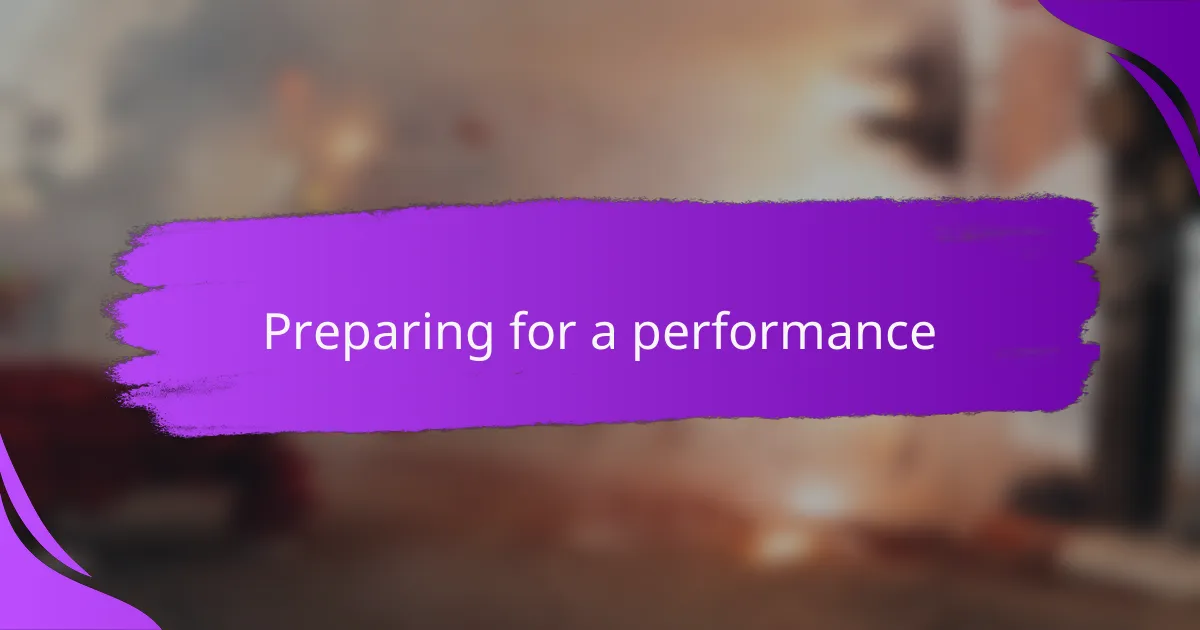
Preparing for a performance
When preparing for a performance, I discovered that the importance of rehearsal cannot be overstated. Each time I stepped on stage at The Orpheum Theatre, I made it a point to go through my setlist repeatedly. This repetition not only built my comfort with the material but also helped to steel my nerves. You know that feeling of uncertainty before performing? It completely dissipated with every practiced note.
Visualization became a personal ritual for me as well. I would close my eyes and imagine every detail: the lights dimming, the audience’s eager faces, and the music enveloping the space. This mental imagery worked wonders; instead of fearing what might go wrong, I started to see myself thriving. Have you ever imagined a moment vividly enough that it felt like a preview of your own success? It’s this mental rehearsal that can truly set the stage for triumph.
On top of all this, I found that setting small, achievable goals before each performance helped to ease the pressure. After all, what is one show in the grand scheme of an artist’s journey? I would focus on delivering a great first song rather than getting lost in the entirety of the performance. This approach not only made the experience feel more manageable but also allowed me to celebrate small victories along the way. Isn’t it empowering to shift the focus to incremental achievements rather than the daunting end goal? It truly made a difference for me.
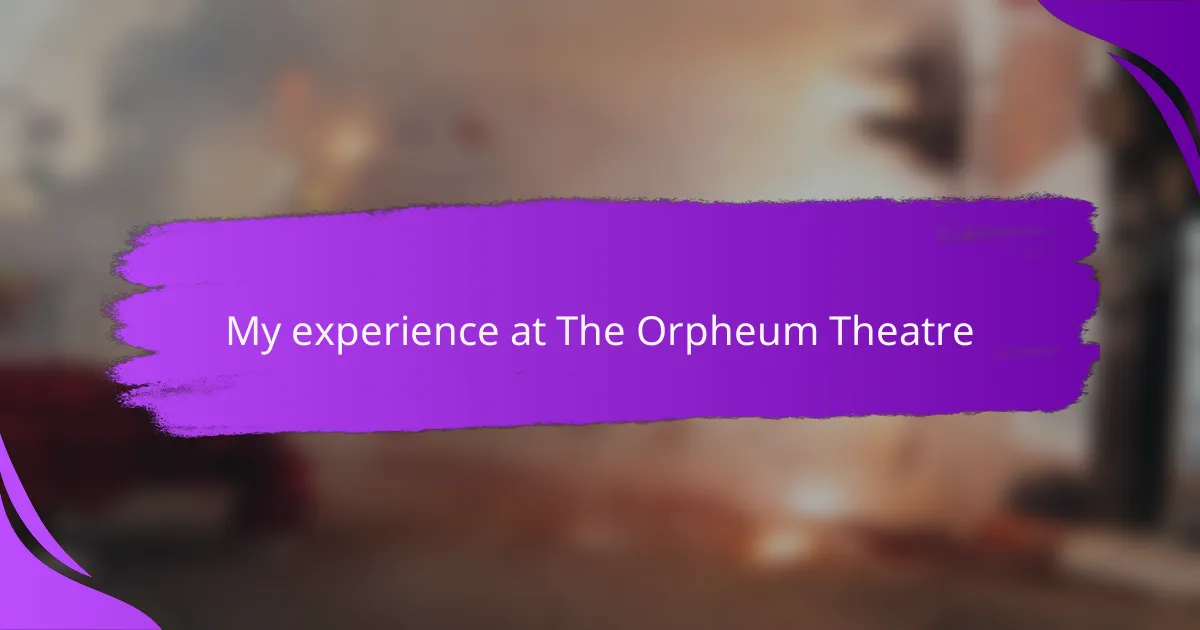
My experience at The Orpheum Theatre
Standing on the historic stage of The Orpheum Theatre, I could feel the weight of anticipation in the air. The moment before I stepped into the spotlight, I was engulfed by a whirlwind of emotions. I remember looking out at the audience, their faces appearing as a blur, and wondering if they could see the tremors in my hands. It’s astonishing how such a grand venue can evoke both excitement and fear in equal measure.
As the music began to play, I took a deep breath and settled into the rhythm. Suddenly, those initial nerves transformed into a rush of energy. There’s something uniquely liberating about performing in a space filled with history and artistry. I found myself lost in the moment, connecting with the audience in a way I never imagined possible. Have you experienced that sense of exhilaration when you let go of the fear and simply embrace the performance? For me, it felt like the room surged with a shared joy.
Each time I performed at The Orpheum, I realized that overcoming stage fright was less about vanquishing fear and more about harnessing it. I would often think back to my earlier days, where the mere thought of performing would paralyze me. Yet, standing there; I understood that each show was an opportunity for growth. It’s incredible how far I came from that anxious artist backstage to someone who could thrive in the spotlight. Each performance became a testament to resilience, and I couldn’t help but feel proud of the journey I had taken.
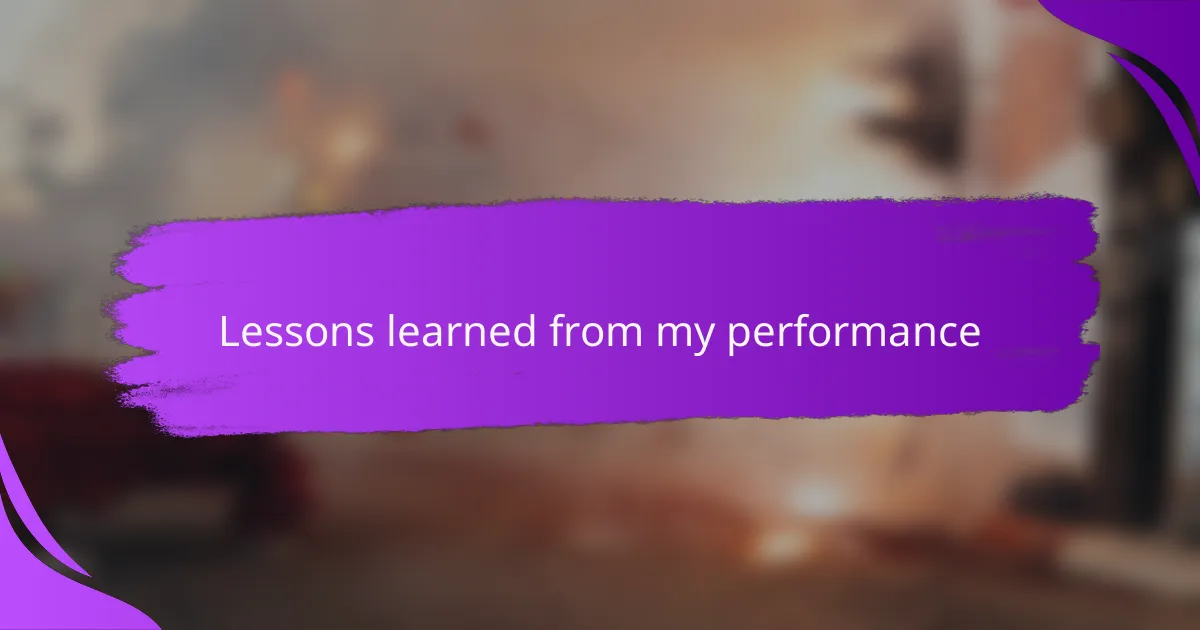
Lessons learned from my performance
Overcoming stage fright at The Orpheum Theatre taught me invaluable lessons about preparation and self-belief. I found that visualizing my performance ahead of time calmed my nerves significantly. The emotional rush of connecting with the audience made every second worth confronting my fears.
The night of my performance, I clearly remember feeling my heart race as I walked on stage. But as I engaged with the crowd, their energy transformed my anxiety into exhilaration. This experience reaffirmed that vulnerability can create tangible connection and authenticity in art.
| Lesson | Personal Insight |
|---|---|
| Preparation is key | Feeling confident through practice helped ease my nerves. |
| Engagement with the audience | Connecting with them turned my fear into excitement. |
| Vulnerability breeds connection | Embracing my nerves made me more relatable and genuine. |
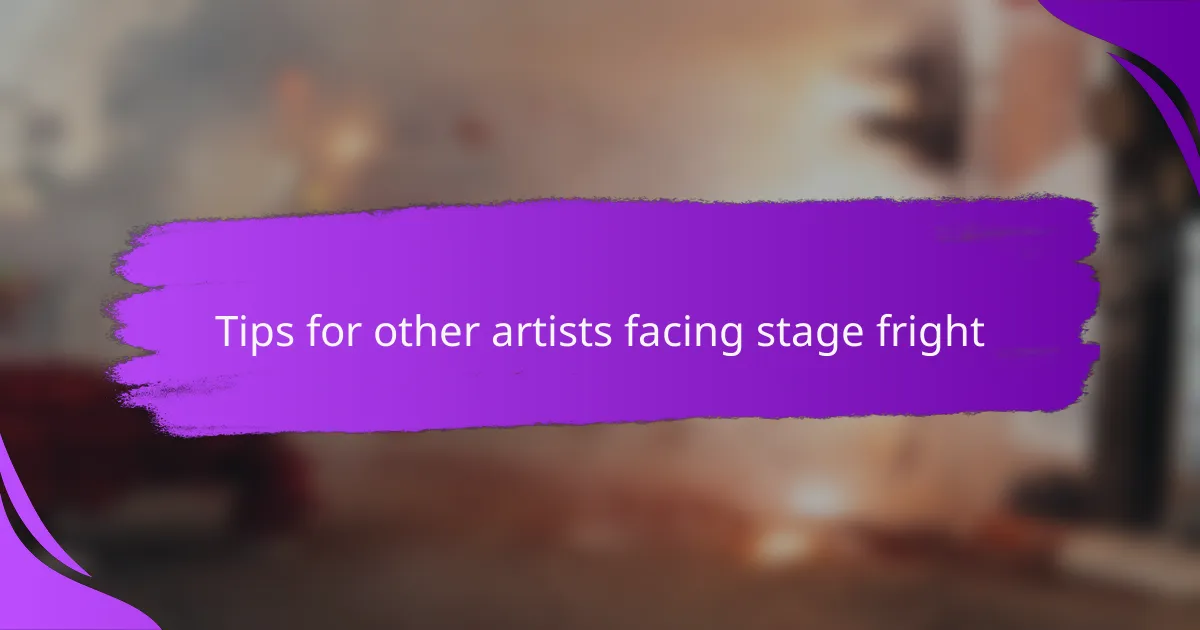
Tips for other artists facing stage fright
Facing stage fright can feel overwhelming, but I’ve discovered several strategies that can make a significant difference. I remember the nights when my heart raced, and my palms were sweaty just thinking about stepping on stage. It was through practice and preparation that I gradually built my confidence. The more I performed, the more comfortable I became in those high-pressure moments.
Here are some tips that have helped me and could benefit fellow artists:
- Breathe Deeply: Before going on stage, take a few deep breaths to calm your nerves. It sounds simple, but it really works.
- Visualize Success: Picture yourself performing well. This mental rehearsal can create a sense of familiarity and reduce anxiety.
- Start Small: If you’re just starting out, try performing in front of friends or a small gathering before hitting the big stage.
- Create a Pre-Show Ritual: Develop a routine that helps you get into the zone, whether it’s listening to a specific song or doing a brief warm-up.
- Connect with the Audience: Focus on the people in front of you instead of thinking about how you’re performing. Building that connection can transform your experience.
- Remember, You’re Not Alone: Many artists face stage fright. Sharing your feelings with peers can provide support and reassurance.
